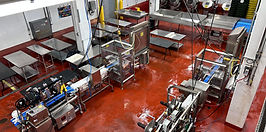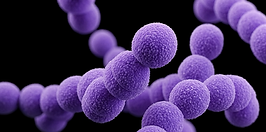
Food Processing Cleaning Services
Food Manufacturing Cleaning Services
Our food manufacturing cleaning services help you maintain compliance with FDA and USDA regulations, while also minimizing the risk of contamination. We specialize in deep cleaning, disinfection, and routine sanitization tailored specifically for your food plant. Our certified team is here to protect your food plant, your brand, and your bottom line.
Why wait for an outbreak?
Cleaning Services for Manufacturers
Cleaning Services
You Can Count On
Our team is HACCP certified and incorporates advanced sanitization techniques. Our process minimizes downtime and provides the most effective results possible.
10+ years of sanitization experience
Fully insured certified technicians
24/7 Emergency Service



Food Manufacturing Cleaning Services
Request Your Free
No-Obligation Estimate
ITS Environmental Services tailors its cleaning program to meet your facility's specific needs, ensuring cleanliness with minimal downtime. Dealing with an outbreak now? Call us for emergency service or fill out the form below to request a quote.
temportal
Cleaning for Food Manufacturing
Food Production Cleaning Services


Sanitation Services for Food Manufacturing
Our quarterly cleaning provides regular maintenance preventing bacterial buildup, and contamination risks. Allowing your plant to maintain consistent regulatory compliance.
Regular deep cleaning helps address high risk zones like hard-to-reach areas on equipment that daily cleaning may miss. Consistently scheduled sanitization also improves audit readiness and extends the lifespan of your machinery too.
Prevent Outbreaks with Preventative Maintenance
Quarterly Cleanings
Comprehensive Cleaning
High Risk Zone Cleaning
Remain FDA & USDA Compliant
Sanitation Food Manufacturing Services
Food Manufacturing Sanitation
1
Call Us
2
Get a FREE inspection
and no obligation estimate
3
Restore safety for your plant and employees.
Tailored Food Plant Cleaning for Your Facility
Why Choose Our Cleaning Services?
1. Prevent Food Contamination
-
Microbial Control: Food processing environments are prone to the growth of bacteria, mold, and yeast. This can lead to food borne illnesses if not controlled. Regular deep cleaning helps eliminate pathogens like listeria monocytogenes, salmonella, and ecoli.
-
Cross-Contamination: Residues from allergens or different food products can contaminate subsequent batches, posing major health risks. Thorough cleaning prevents this cross-contact. This is why we are so passionate about quarterly cleanings!
2. Food Regulatory Compliance (Stay Audit Ready!)
-
Food Safety Standards: The FDA, USDA, and local health departments set strict hygiene standards. Regular cleaning ensures compliance with those regulations.
-
Audit Preparedness: Regular deep cleaning keeps facilities audit-ready, reducing the risk of violations that could lead to fines, shutdowns, or recalls. We take pride in the work we do, by empowering food plants to remain compliant, continue to build their brand, and provide a trustworthy service.
3. Prolong your Food Plant Cleaning Equipment
-
Reducing Downtime: Accumulated debris, grease, and residue can cause equipment malfunctions or breakdowns. Routine cleaning can really extend the lifespan of the equipment in your food plant. Not to mention, ensuring optimal performance of those machines as well.
-
Energy Efficiency: Clean equipment operates more efficiently, reducing energy consumption and maintenance costs as well.
4. Food Plant Quality Assurance
-
Consistency: When your food plant is thoroughly clean on a consistent basis, this further maintains the product quality, taste, and appearance of the product.
-
Shelf Life: Reducing microbial load helps extend the shelf life of products, minimizing spoilage and waste.
5. Pest Control and Sanitization
-
Deterrence: Food residue attracts pests like rodents, insects, and birds. When your food plant is thoroughly cleaned on a regular basis, this prevents pests from seeing your plant as a food source and reduces the risk of infestations
6. Workplace Safety
-
Reducing Hazards: Grease, spills, and clutter causes tip and fall hazards. Regular cleaning even improves workplace safety for your employees too.
-
Improved Air Quality: Removing dust, mold, and chemical residues enhances air quality, reducing respiratory issues and other health risks for workers.
7. Reputation Management
-
Consumer Trust: Consistently clean facilities reduce the likelihood of recalls and food borne illness outbreaks, maintaining brand integrity and consumer confidence.
-
B2B Relationships: Businesses supplying food products to retailers or distributors must mean stringent hygiene standards to retain contracts and partnerships.
In summary, semi-annual or quarterly deep cleaning is not just a regulatory requirement but a best practice that supports food safety, operational efficiency, and the reputation of your brand.
It is less costly to have semi annual or quarterly cleaning and disinfection as opposed to a detected outbreak, recall and or regulatory mandatory stoppage at your facility. ITS Environmental Services tailors our program around what your specific facility needs. We are here to make sure your facility is at it's highest level of cleanliness with minimal interruptions to processing time. We would be happy to provide a free no obligation estimate. Call today!

Doug Baruchin, Owner

ITS Environmental Services
Customer Reviews
“Hire them no questions asked!”
“Responsive, kind, and knowledgeable, and a team was there within 48 hours. They went above and beyond. I'm so relieved!”
Heather A.
“They made me feel 100% comfortable”
“They allayed my fears and made me feel good about the decision. Thank you for making a difficult situation smooth and easy to resolve!”
Lynn B.
“Best Investment Ever!”
“They set up a crew to come within a couple hours. What I imagined would never be perfectly clean again was spotless! Acute attention to detail and incredibly kind crew.”
Emily R.
Food Processing Protocols
Preventative Maintence
When it comes to food plant cleaning, preventative maintenance on a regular schedule is critical. Not only does it help keep your plant compliant with the FDA and USDA standards, it also reduces the chance of cross contamination, equipment failure, and costly downtime if your plant had to shut down for a while because of an outbreak. Regularly scheduled cleaning and sanitation services—such as quarterly or semi-annual deep cleans—ensure that facilities remain compliant with food safety regulations and maintain consistent hygiene standards. By addressing potential issues before they become serious problems, preventative maintenance protects product integrity, extends equipment life, improves worker safety, and supports overall operational efficiency and long-term business sustainability.

Quarterly Cleanings

Comprehensive Cleaning

High Risk Zone Steam Cleaning

Remain FDA & USDA Compliant
Food Manufacturing Cleaning Services
Eliminate Invisible Threats
Our food plant cleaning service isn't about just cleaning the surface. We specialize in deep sanitization. Eliminate harmful pathogens like Listeria, Salmonella, E. coli, and Histoplasmosis just to name a few. Our advanced disinfecting process penetrates every nook and cranny. From high-traffic areas to the hardest-to-reach corners, our rigorous protocols guarantee the removal of contaminants. Our service provides peace of mind that your plant operates with the highest standards of safety and hygiene.

Listeria Disinfection

Salmonella Disinfection

E Coli Disinfection

Restaurant Cleaning Solutions
Cleaning Solutions
In the fast-paced food industry, maintaining clean and efficient facilities is critical to productivity and safety. Our team provides specialized cleaning solutions for food processors across North America, combining advanced technology and innovative engineering to deliver superior results. From sanitizing conveyor belts and removing buildup in grout to using dry ice blasting and vacuum trucks for deep industrial cleaning, we tailor every service to meet your facility’s exact needs. Whether your operation involves warehouse maintenance, post-construction cleanup, or precision cleaning for production lines, our expert technicians ensure every surface is left cleaner, safer, and compliant with strict industry standards. We use strict, specialty chemicals on surfaces to minimize shut down in manufacturing.
